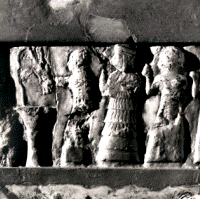In: Book
Causal Mythology
 Bought a copy of Olson’s Causal Mythology at a local used book store a couple of days ago (an unusually good find for this store). I have never known what to make of Olson. His particular brand of incoherence conflicts with mine, I guess. I do quite like his poems in Allen’s anthology, but the Maximus poems strike me as 85% noise, 15% lofty Pound-imitation. This is the kind of brash evaluation, of course, that, through some sort of poetic Heisenberg Principle, will cause my opinion to reverse itself a week later, merely through having been expressed by me. It’s happened before, many times. Recently, for example, I said on a mailing list that I couldn’t warm up to H.D. as much as I could to some other modernists, and almost immediately thereafter found myself rapt by Barbara Guest’s bio Herself Defined (which I found at the same book store–actually, when I think about it, they do get quite a bit of decent stuff there from time to time), and from there to Hermetic Definition, which is an astounding piece of work.
Bought a copy of Olson’s Causal Mythology at a local used book store a couple of days ago (an unusually good find for this store). I have never known what to make of Olson. His particular brand of incoherence conflicts with mine, I guess. I do quite like his poems in Allen’s anthology, but the Maximus poems strike me as 85% noise, 15% lofty Pound-imitation. This is the kind of brash evaluation, of course, that, through some sort of poetic Heisenberg Principle, will cause my opinion to reverse itself a week later, merely through having been expressed by me. It’s happened before, many times. Recently, for example, I said on a mailing list that I couldn’t warm up to H.D. as much as I could to some other modernists, and almost immediately thereafter found myself rapt by Barbara Guest’s bio Herself Defined (which I found at the same book store–actually, when I think about it, they do get quite a bit of decent stuff there from time to time), and from there to Hermetic Definition, which is an astounding piece of work.
But I’m not there yet with Olson.
 Nevertheless, there is something fascinating about his self-absorbed rambling in late lectures and interviews. Maybe this is perverse fascination on my part, but in those pieces he’s really trying to get at the core of the inarticulate universe, and he doesn’t care if it takes all night to get there. In Causal Mythology, I love the way he reads the same longish poem twice during the course of the lecture, to the patient applause of his followers.
Nevertheless, there is something fascinating about his self-absorbed rambling in late lectures and interviews. Maybe this is perverse fascination on my part, but in those pieces he’s really trying to get at the core of the inarticulate universe, and he doesn’t care if it takes all night to get there. In Causal Mythology, I love the way he reads the same longish poem twice during the course of the lecture, to the patient applause of his followers.
The substance of the lecture? You tell me. Were people really taking this seriously as poetics, or did everyone just know he was crazy and respect him too much to tell him that his comments were unintelligible? I have the same thoughts about Duncan, to a lesser extent. He is much more lucid, but like so many of those Black Mountain types, just goes ON and ON with the Jung-oid, pseudo-Eastern nonsense. Even Creeley did (and I think still does) this, albeit in a more palatable, allusive, minimalist way. He often strikes me as a more talented and intelligent Rod McKuen. Which I must admit I like. (Michael Palmer fits this description as well.)
Am I stating the obvious here?
 I remember when first reading these field-composition guys twenty years ago being repelled by what seemed to me to be spacy indulgence without restraint. I hated the “pretty” poesy-speak and “hippie” mythology. I hated the way they abbreviated everything. Of course, at the time, I was impressed by poets like Mark Strand and Donald Justice, with their cool rational ultra-grammatical poise. I made myself embrace the Open Form approach later, out of rebellion, and it was rewarding in many ways, but it took a supreme effort of self-dissociation. I realized how much of the old bias I still harbor, however, a couple of weeks ago when Ron Silliman sang the praises of Robert Kelly on his blog. How could anyone like that kind of thing? Now, I feel compelled to look more closely at Kelly, which is a good thing, I guess.
I remember when first reading these field-composition guys twenty years ago being repelled by what seemed to me to be spacy indulgence without restraint. I hated the “pretty” poesy-speak and “hippie” mythology. I hated the way they abbreviated everything. Of course, at the time, I was impressed by poets like Mark Strand and Donald Justice, with their cool rational ultra-grammatical poise. I made myself embrace the Open Form approach later, out of rebellion, and it was rewarding in many ways, but it took a supreme effort of self-dissociation. I realized how much of the old bias I still harbor, however, a couple of weeks ago when Ron Silliman sang the praises of Robert Kelly on his blog. How could anyone like that kind of thing? Now, I feel compelled to look more closely at Kelly, which is a good thing, I guess.
What I’m trying to get at here is a question about individual taste. How significant is the individual’s untheorized gut reaction to different branches of poetry? Significant in what way? Is it hypocritical of me to force myself to “like” (or at least engage with) work that I don’t have a natural inclination towards? Or is this just part of maturing as a poetic/political/social participant? Here’s something weird: my core distrust of the Black Mountain Poets and their associates has probably made me write more like them in certain ways than like groups I take much more enjoyment in reading (Language, New York School). How does that work? Is it that there’s something there I just don’t get, and not getting it makes me feel like I have to master it, even if it means changing my own poetic personality? Forget “master”; I’ll never even come close to that, as I don’t have the interest or discipline to sit down with a rigorous study of Black Mountain poetics or anything like that, let alone to read the Maximus poems front to back. All I can really respond to are the elements here and there of things that are real for me in the work I do have the patience for: early Olson as I said, Duncan’s great mid-sixties work, most of Creeley, even some early poems by Levertov (e.g. “The Springtime”). The work of Spicer, Wieners, et al. is in another category, though related. With them, I sense a pushing toward something more negatively critical and/or formally resistant, though I can’t quite define it. Is it just my retroactive narrativizing of its anticipation of Language Poetry etc.?